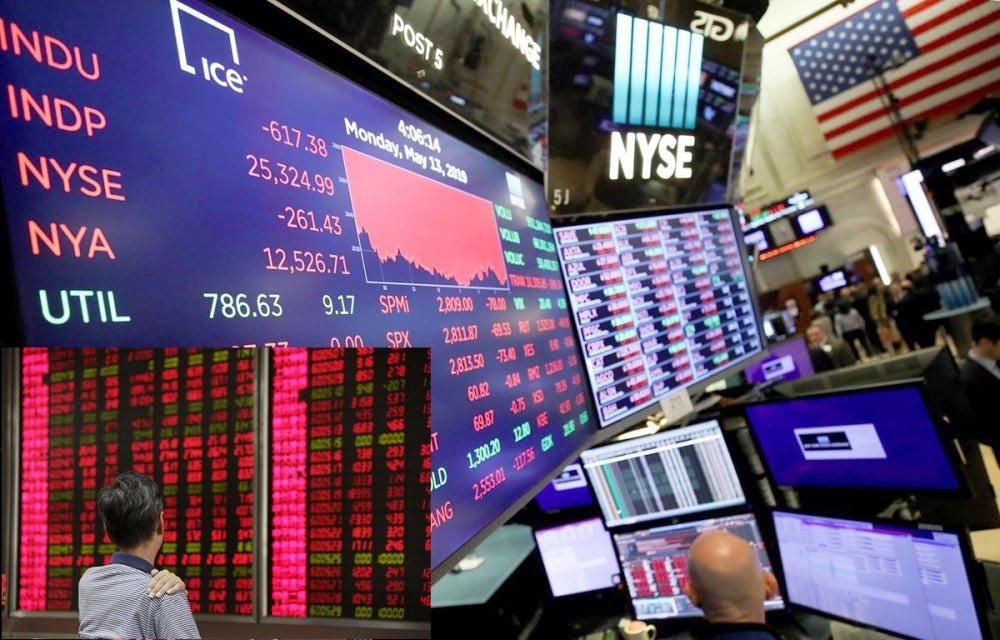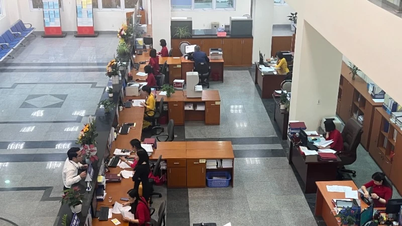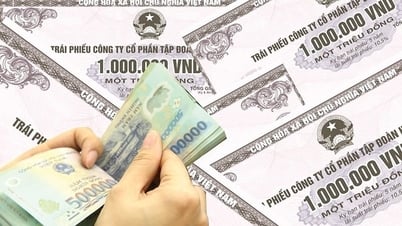In the morning trading session on March 31, Asian stocks fell sharply following news that the US would impose tariffs on imported cars, causing stocks in the auto and semiconductor industries to plummet.
In Japan, the Nikkei 225 index fell 3.02% at the open to 35,997.56, with auto stocks taking the biggest hit. Toyota, Honda and Nissan all fell more than 2% on concerns that tariffs would increase the cost of exporting to the US market.
 |
| Asian stocks fall sharply, with heavy selling pressure in South Korea and Japan |
In South Korea, the KOSPI index fell 2.8% to a two-week low. Technology and auto stocks were under heavy selling pressure, with Samsung Electronics down 2.16%, SK hynix down 2.86% and Hyundai Motor down 2.2%.
Chinese stocks were no exception. Hong Kong's Hang Seng Index fell 0.94% to 23,207.07, while the Shanghai Composite Index lost 0.1% to 3,349.68.
The plunge in Asian markets reflects investor caution over the possibility of escalating trade tensions, especially as US President Donald Trump is expected to announce reciprocal tariffs on April 2.
The Japanese market was hit hardest as investors reacted negatively to the US trade move. In the morning session, the Nikkei Stock Average fell 4.1% (equivalent to 1,545 points) just half an hour after opening.
The broader Topix index also fell 4% on the double blow of auto tariffs and expectations the Bank of Japan will soon raise interest rates. The yen rose 1% to 148.76 yen per dollar, reflecting expectations of tighter monetary policy as inflation exceeds the 2% target.
"Japanese stocks are likely to remain volatile, especially in the auto and semiconductor sectors. US trade policy may make Japanese companies more cautious in providing profit forecasts for the next fiscal year."
Amid the uncertainty, analysts have lowered their forecast for Topix earnings per share growth to 5.5% from 7.8%, while revising the Nikkei's year-end target to 41,000 from 43,000 previously.
President Donald Trump is expected to announce reciprocal tariffs on April 2, after he previously imposed a 25% tax on all cars imported into the U.S. The policy has faced strong opposition from the global auto industry, with manufacturers warning that it could raise prices and strain supply chains.
Concerns about an escalating trade war sent MSCI's broadest index of Asia-Pacific shares outside Japan down 0.5%. Investors are closely watching the U.S. administration's next move, with details of tariffs and the list of affected goods still unclear.
“It’s no surprise that the tariff talk is leading to another risk-off sell-off. Investors are worried that tariffs will both stifle growth and push up inflation,” said Thierry Wizman, global FX and interest rates strategist at Macquarie.
Meanwhile, US economic data is also being closely watched. The March 2025 jobs report, due on April 4, will be an important indicator of the health of the US economy. If the number of jobs increased by less than 140,000, fears of a US economic recession could increase.
Cautious sentiment has weakened demand, with blue-chip stocks facing strong selling pressure. Investors are waiting for further developments in the US-China trade war to have a clearer direction.
In currency markets, the dollar continued to weaken on concerns about the impact of tariffs on US economic growth. The euro was steady at $1.07942, heading for a 4% gain in the first quarter of 2025.
The Japanese yen has gained nearly 4% this quarter, to 150.76 yen per dollar, as investors expect the BOJ to raise interest rates again in the near term.
Meanwhile, gold prices rose sharply due to the search for safe-haven assets. Spot gold prices reached $3,073.31/ounce, up 0.58%, heading for the strongest quarterly increase since 1986.
Oil prices were little changed as the market assessed the impact of US tariffs. Brent crude futures fell 0.07% to $73.98 a barrel, while WTI crude also fell 0.07% to $69.87 a barrel.
Given the current developments, Asian stock markets could remain under pressure in the short term, especially if the US announces tougher-than-expected tariffs. Investors are closely watching how major economies, especially China, Japan and South Korea, react to Washington’s new trade policies.
Source: https://thoibaonganhang.vn/chung-khoan-chau-a-dong-loat-giam-trong-ngay-dau-tuan-313-162075.html




![[Photo] National Assembly Chairman Tran Thanh Man chairs the meeting of the Subcommittee on Documents of the First National Assembly Party Congress](https://vphoto.vietnam.vn/thumb/1200x675/vietnam/resource/IMAGE/2025/5/8/72b19a73d94a4affab411fd8c87f4f8d)

![[Photo] General Secretary concludes visit to Azerbaijan, departs for visit to Russian Federation](https://vphoto.vietnam.vn/thumb/1200x675/vietnam/resource/IMAGE/2025/5/8/7a135ad280314b66917ad278ce0e26fa)
![[Photo] President Luong Cuong presents the decision to appoint Deputy Head of the Office of the President](https://vphoto.vietnam.vn/thumb/1200x675/vietnam/resource/IMAGE/2025/5/8/501f8ee192f3476ab9f7579c57b423ad)















![[Infographic] Import and export of goods in April increased by 21.3% over the same period](https://vphoto.vietnam.vn/thumb/402x226/vietnam/resource/IMAGE/2025/5/8/e47b4aa8acd3418a91fe426dc0e89a72)
![[Photo] General Secretary To Lam receives leaders of typical Azerbaijani businesses](https://vphoto.vietnam.vn/thumb/1200x675/vietnam/resource/IMAGE/2025/5/8/998af6f177a044b4be0bfbc4858c7fd9)

































![[Photo] Prime Minister Pham Minh Chinh talks on the phone with Singaporean Prime Minister Lawrence Wong](https://vphoto.vietnam.vn/thumb/402x226/vietnam/resource/IMAGE/2025/5/8/e2eab082d9bc4fc4a360b28fa0ab94de)

































Comment (0)